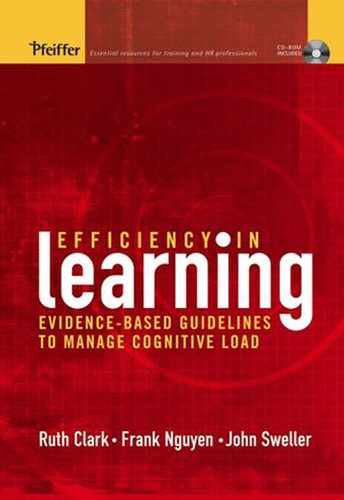IN PART IV WE DESCRIBE some of the more recent research using cognitive load theory. Specifically, we discuss how instructional methods must be adjusted as learners gain expertise. In cognitive load theory, the changes in cognitive load support required as learning progresses is called the expertise reversal principle. Since learning involves a gradual transition from novice to expert, ideal instruction should be dynamically adjusted to accommodate evolving expertise. Adapting instructional methods in e-learning by using rapid tests offers one recently discovered method you can use to assess learner expertise quickly and to tailor instruction appropriately.
Read | To Find Out How to |
|---|---|
Chapter 10. Accommodate Differences in Learner Expertise | Write effective text for novice and expert learners Eliminate instructional elements that become redundant for experts |
Transition from worked examples to problem assignments as learners gain expertise | |
Use directive course designs for novice learners | |
Chapter 11. Use Rapid Testing | Design tests that allow you to tailor instruction to changing expertise of learners |
Video Interview with John Sweller: Preview/Review
Chapter 10. Accommodate Differences in Learner Expertise. A discussion of which individual differences should influence instruction and a description of the expertise reversal effect.
Chapter 11. Use Rapid Testing to Adapt e-Learning. A discussion of adaptive testing, including an example, potential future applications of rapid testing and learner control.
Sample Excel e-Lessons
After: Load-Managed Excel Web-Based Lesson. This asynchronous e-learning sample starts with a rapid test that will branch the learner to the appropriate instructional methods based on their demonstrated expertise. If you view the entire program, you will notice a transition in examples so that initial worked examples gradually require more and more learner work to complete, eventually ending with full practice assignments. In this way learner input is increased and instructor input is decreased gradually as the learner gains expertise.
Beyond Learning Styles: Which Differences Matter?
What Are Interactions?
How Cognitive Load Changes with Greater Expertise
Cognitive Load Methods Are Schema Substitutes
Expertise Reversal Applied
Evidence for Expertise Reversal
Comparison Group Experiments
Staged Experiments
Guideline 25: Write High Coherent Texts for Low Knowledge Readers
Guideline 26: Avoid Interrupting Reading of Low Skilled Readers
Applying the Research
Guideline 27: Eliminate Redundant Content for More Experienced Learners
When to Drop the Diagram or Drop the Text
Guideline 28: Transition from Worked Examples to Problem Assignments as Learners Gain Expertise
A Review of Research on Worked Examples as Learning Progresses
Applying the Research
Guideline 29: Use Directive Rather Than Guided Discovery Learning Designs for Novice Learners
Applying the Research
The Bottom Line
On the CD
John Sweller Video Interview
Sample Excel e-Lesson
